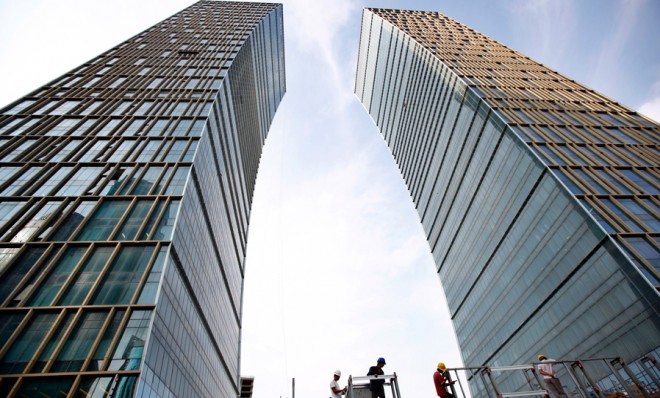Will China fall victim to the skyscraper curse?
A developer just broke ground on what is set to become tallest building in the world — and some see it as a terrible omen

A free daily email with the biggest news stories of the day – and the best features from TheWeek.com
You are now subscribed
Your newsletter sign-up was successful
Earlier this month, Chinese real estate developer the Broad Group broke ground on Sky City, a planned skyscraper on the outskirts of Changsha, China, that less than 10 months from now is set to tower 2,749 feet in the air — overtaking the Burj Khalifa in Dubai as the world's tallest building.
Almost as soon as the plan was announced, however, members of the press warned that China was in danger of running afoul of the Skyscraper Index, a 15-year-old theory that correlates the construction of the world's tallest buildings with major economic catastrophe.
Construction for the Empire State Building, for example, broke ground in 1930, in the first months of the Great Depression. The World Trade Center and Sears Tower opened in 1973 during the 1973-74 stock market crash and 1973 oil crisis. The Burj Khalifa finished construction in 2010, right as Dubai started feeling the effects of the most recent global financial crisis.
The Week
Escape your echo chamber. Get the facts behind the news, plus analysis from multiple perspectives.

Sign up for The Week's Free Newsletters
From our morning news briefing to a weekly Good News Newsletter, get the best of The Week delivered directly to your inbox.
From our morning news briefing to a weekly Good News Newsletter, get the best of The Week delivered directly to your inbox.
The idea is that record-breaking skyscrapers are born out of reckless overconfidence, and many say China's economy, with its overheated real estate market, fits that description to a tee. The economy's growth rate, which touched 15 percent in 2008, is expected to drop to just 7.5 percent this year. London-based Barclays forecasts growth falling to 3 percent or below within the next three years.
At the same time, the country is experiencing a classic credit bubble, says International Business Times, the result of a poorly regulated "shadow banking" sector that has seen credit expand at an annual rate of more than 50 percent, with much of the lending going to higher-risk borrowers. "Since 2008, total credit in the Chinese economy has jumped by 75 percentage points to 200 percent of GDP; by comparison, the rate was only 40 percent before the U.S. subprime bubble burst," says IBT.
So is there something to the skyscraper curse? In Bloomberg, William Pesek says there is, and explains how Broad Group's fast, cheap construction plans for Sky City adds an extra layer of symoblism.
The Changsha project is a particularly interesting metaphor for China’s economy. The blistering pace at which the building will go up — more than two stories a day — raises serious concerns. Broad Group’s claim to fame is prefabricated steel and concrete modules that supposedly make construction cheaper and more ecologically friendly. Last year, it put up a 30-story hotel in just 15 days. Yet how well can a 202-story building that is essentially a giant Lego set withstand earthquakes, extreme wind or fire?
China, too, has grown with seemingly impossible rapidity. But fast and cheap growth doesn’t mean China has created a stable, efficient or diverse economy. That has become especially apparent since 2008, when Beijing nimbly steered around the global crisis. It only did so by doubling down on credit excesses that it’s now having trouble controlling — including asset bubbles and the surge in local-government debt. [Bloomberg]
Not all economists, however, are on the same page about China's falling growth rate. "Some view it as evidence the world’s second-largest economy is finally being pulled into the global recession, and others see it as a signal the economy is maturing and becoming self-sufficient, rather than export and investment driven," says RT.
A free daily email with the biggest news stories of the day – and the best features from TheWeek.com
Indeed, other analysts say China can take an economic hit without derailing progress entirely.
"[China's] central government has the fiscal strength both to absorb losses and to stimulate the economy if necessary," says The Economist. "That is a luxury few emerging economies have ever had. It makes disaster much less likely."
And even though Broad Group broke ground on Sky City on July 20, China's government has yet to give it the official green light. The developer has so far failed to get the proper permits required to proceed with construction, says CNN.
The hang-up could nip the project in the bud — and possibly spare China economic disaster.
Carmel Lobello is the business editor at TheWeek.com. Previously, she was an editor at DeathandTaxesMag.com.